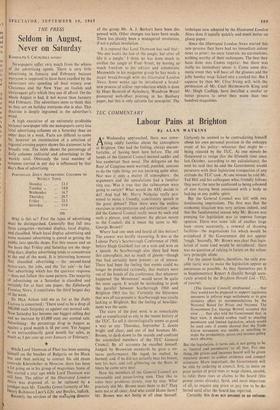THE PRESS
Seldom in August, Never on Saturday
RANDOLPH S. CHURCHILL writes:
Newspapers suffer very much from the whims of the advertising agents. There is very little advertising in January and February because everyone is supposed to have been cajolled by the advertisers into spending all their money ovor Christmas and the New Year on foolish and extravagant gifts which they can ill afford On ttie Whole August is bad, it not worse than January and February. The advertisers seem to think that as they are on holiday everyone else is also. This doctrine is deeply ingrained in the advertiser's mind.
A high executive of an extremely profitable national newspaper tells me newspapers carry less total advertising columns on a Saturday than on other days in a week. Facts are difficult to come by; however an examination of a selection of regional evening papers shows this statement to be broadly true, The table shows the percentage of daily columns (editorial and advertising) to the Weekly total. Obviously the total number of columns carried in any day is influenced by that day's flow of advertising.
PERCENTAGE DATLY ADVERTISING COLUMNS TO WEEKLY TOrAL
Monday, .. .. 13.5 Tuesday ... .. 14.0 Wednesday 16.7 Thursday .. 20.7 Friday .. 23.5 Saturday .. 11.6 100
Why is this so? First the types of advertising must be distinguished. Generally they fall into three categories—national display, local display, and classified. Much local display advertising and some national advertising is aimed at getting the Public into specific shops. For this reason and on the basis that Friday and Saturday are the shop- Ping days, display advertising tends to concentrate at the end of the week. It is interesting however that classified advertising the second-hand motor-cars, the jobs, and the 'for sale'—in fact that advertising which has the quickest response —does not follow this same pattern. The majority of advertising on a Saturday is classified and certainly for at least one paper, the Edinburgh Evening News, it constitutes the third largest day Of the week.
Sir Max Aitken told me as far as the Daily Express is concerned: 'There used to be a drop of 100,000 each Saturday as against our normal sale. Now Saturday has become our biggest selling day and we increase by 65,000 over our normal sale. Advertising: the percentage drop in August as against a good month is 48 per cent. Yet August is an extraordinarily good month for sales, as much as 3 per cent up over January or February.'
While Lord Thomson of Fleet has been sunning himself on the beaches of Bulgaria on the Black Sea and then seeking to contact his old chum Comrade Khrushchev in Moscow, there has been a lot going on in his group of magazines. Some of this started a year ago while Lord Thomson was Still here. The editor of the Illustrated London News' was disposed of, to be replaced by a Younger man Mr. Timothy Green formerly of Mr. Henry Robinson Luce's Life, and Beccles, Suffolk.
Recently the services of the managing director of the group Mr. A. J. Burkart have been dis- pensed with. Other changes too have been made. There has plainly been a managerial revolution, if not a palace revolution.
It is reputed that Lord Thomson has -.aid that : 'No one wants the law of the jungle; but after all life is a jungle.' I think he has done much to civilise the jungle ol Fleet Street, by leaving so much freedom to his editors and columnists. Meanwhile in his magazine group he has made a major breakthrough with the Illustrated London News. Some weeks ago he introduced a brand- new process of colour reproduction which is done • by Hunt Barnard of Aylesbury, Woodrow Wyatt pioneered web-offset printing in his Banbury paper, but this is only suitable for newsprint. The technique no adopted by the Illustrated London News does it equally quickly and much better on glossy paper.
Since the Illustrated London News started this new ,process they have had no immediate colour news to print: no state funerals, no coronations, nothing worthy of their techniques. The best they have done was Cowes regatta: but there was really no immediacy about it. Come some dra- matic event they will have all the glossies and the jolly Sunday mag: licked into a cocked hat. But I suppose by then Mr. Clive Irving will, with the permission of Mr. Cecil Harmsworth King and Mr. Hugh Cudlipp, have installed a similar or better process to serve their more than two hundred magazines.


































 Previous page
Previous page